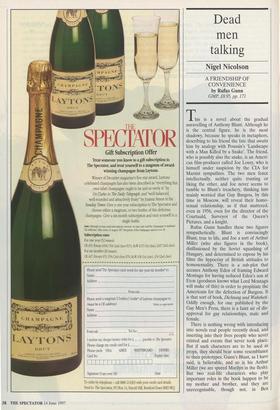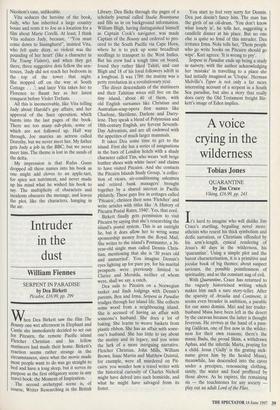Dead men talking
Nigel Nicolson
A FRIENDSHIP OF CONVENIENCE by Rufus Gunn GMP, £8.95, pp. 171 This is a novel about the gradual unravelling of Anthony Blunt. Although he is the central figure, he is the most shadowy, because he speaks in metaphors, describing to his friend the fate that awaits him by analogy with Poussin's 'Landscape with a Man Killed by a Snake'. The friend, who is possibly also the snake, is an Ameri- can film-producer called Joe Losey, who is himself under suspicion by the CIA for Marxist sympathies. The two men fence intellectually, neither quite trusting or liking the other, and Joe never seems to tumble to Blunt's treachery, thinking him mainly worried that Guy Burgess, by this time in Moscow, will reveal their homo- sexual relationship, as if that mattered, even in 1956, even for the director of the Courtauld, Surveyor of the Queen's Pictures, and a knight.
Rufus Gunn handles these two figures sympathetically. Blunt is convincingly Blunt, true to life, and Joe a sort of Arthur Miller (who also figures in the book), disillusioned by the Soviet squashing of Hungary, and determined to expose by his films the hypocrisy of British attitudes to homosexuality. There is a sub-plot that accuses Anthony Eden of framing Edward Montagu for having seduced Eden's son at Eton (goodness knows what Lord Montagu will make of this) in order to propitiate the Americans for the defection of Burgess. It is that sort of book, Dichtung and Wahrheit. Oddly enough, for one published by the Gay Men's Press, there is a faint air of dis- approval for gay relationships, male and female.
There is nothing wrong with introducing into novels real people recently dead, and inserting into their lives people who never existed and events that never took place. But if such characters are to be used as props, they should bear some resemblance to their prototypes. Gunn's Blunt, as I have said, is believable, and so is his Arthur Miller (we are spared Marilyn in the flesh). But two real-life characters who play important roles in the book happen to be my mother and brother, and they are unrecognisable, though not, in Ben Nicolson's case, unlikeable.
Vita seduces the heroine of the book, Judy, who has inherited a large country house and rents it to Joe as a location for a film about Marie Corelli. At least, I think Vita seduces Judy, because, "'You must come down to Sissinghurst", insisted Vita, who felt quite dizzy, so violent was the pounding of her heart' (like a character in The Young Vtsiters), and when they get there, three suggestive dots follow the sen- tences, 'Judy did not reach her bedroom in the top of the tower that night. She stopped off on the way at South Cottage . . .'; and later Vita takes her to Florence to flaunt her as her latest conquest before Violet Trefusis.
All this is inconceivable, like Vita telling Judy about Harold's gay affairs, and her approval of the Suez operation, which bursts into the last pages of the book. There are too many sub-plots, some of which are not followed up. Half way through, Joe marries an actress called Dorothy, but we never meet her. My father gets Judy a job in the BBC, but we never meet him. The theme is lost in the sands of the delta.
My impression is that Rufus Gunn dropped all these names into his book as one might add cloves to an apple-tart, for spice not nutriment, and never made up his mind what he wished his book to say. The multiplicity of characters and incidents obscures the message, and leaves the plot, like the characters, hanging in the air.











































































 Previous page
Previous page